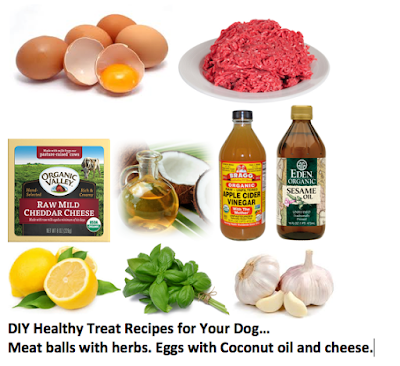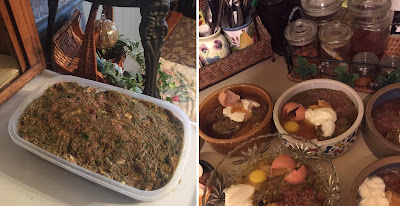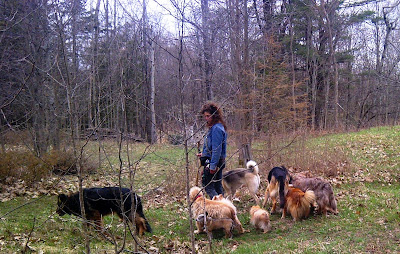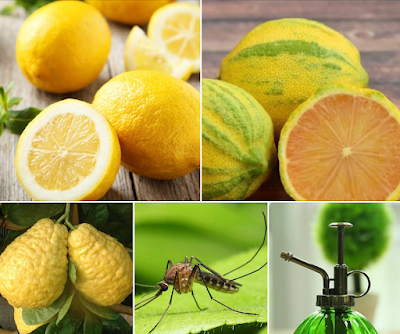Homemade DIY Natural, Healthy Dog Treats - Recipes and Health Benefits
The following recipes are appropriate for:
- Puppies
- Teenage Dogs
- Adult Dogs
- Senior Dogs
Recipe #1 - Meat Balls with Coconut Oil and Herbs
Ingredients
- 3 cups meat or fish.
- 3 to 4 tbs of grass fed pastured sourced butter or coconut oil.
- 3 to 4 tbs of organic apple cider vinegar.
- 2 cups shredded (grated) cheese - American cheese, cheddar cheese, mozzarella, provolone or Swiss cheese.
- 1 fresh lemon (rind, pulp, juice, seeds removed), finely minced.
Optional Ingredients for Dogs
- 4 garlic cloves, finally minced.
- Garlic is a self-section item.
- Note - don't include garlic if your dog is less than 6 months of age.
- 1/8 cup dry or fresh basil, dill or parsley (chopped).
- 1/8 cup ground flax seed, or chia or hemp hearts.
Preparation
- Mix all ingredients together in a large bowl.
- If your dog or cat are not raw fed, use a spoon or your hands to form the mixture into round balls or small patties and gently cook the meat balls or patties.
- If your dog or cat are raw feed, use a spoon or your hands to form the mixture into round balls or small patties, or spoon into ice cube trays and freeze.
- The mixture can also be used to fill a Kong, other stuffer toys, or spread on a licky mat.
Recipe #2 - Scrambled Eggs, Cheese and Coconut Oil
Ingredients
You can cut the recipe in half, thirds, or quarters depending on how many dogs you have. Provided you use whole eggs (both yolk and egg white) when making this recipe your dog can have this treat daily. If you only use the egg white, give this treat a maximum of 3 times per week. Long-term consumption of egg white without the egg yolk can cause biotin deficiency. Egg white contains avidin which over time can interfere with the body's absorption of biotin. Egg yolk contains biotin in sufficient amounts to balance and the intake of avidin, learn more here.
- 6 eggs - free-range, or organic provide the best nutrition
- 1 tsp to 1 tbs grass fed pastured sourced butter or coconut oil (depends on the size of the fry pan you are using)
- 1/2 cup grated/shredded cheese - cheddar, mozzarella, provolone or Swiss
Preparation
- If going raw with this treat just whisk all ingredients together and serve
- If cooking this treat:
- Add the coconut oil to a fry pan and set on low heat
- Crack the eggs into a bowl and whisk them
- Add the grated cheese to the whisked eggs
- Pour the egg and cheese mixture into the heated fry pan and cook on low heat
- Scramble them as they start to cook
- When the eggs are fluffy and still a little moist they are ready to serve
- Allow the scrambled eggs to cool down to warm, before placing the treat in your dog's food bowl
You can cut the recipe in half, thirds, or quarters depending on how many dogs you have. Provided you use whole eggs (both yolk and egg white) when making this recipe your dog can have this treat daily. If you only use the egg white, give this treat a maximum of 3 times per week. Long-term consumption of egg white without the egg yolk can cause biotin deficiency. Egg white contains avidin which over time can interfere with the body's absorption of biotin. Egg yolk contains biotin in sufficient amounts to balance and the intake of avidin, learn more here.
Health Benefits
Cheese - Cheddar, Mozzarella, Provolone or Swiss
Apple
Cider Vinegar (ACV)
Has anti-bacterial, anti-fungal, anti-inflammatory
and anti-viral properties, helps support your dog’s immune system, it is a
natural insect repellent fleas and ticks do not like acidic environments…they don’t
like the smell of ACV. ACV is also excellent for a dog’s coat - when used topically
and when ingested. ACV can also be used to treat
ear infections.
Anise
Seed
Anise seed has anti-oxidant, disease
preventing and many health promoting properties. Anise is rich in B Complex Vitamins,
Vitamin A and C (anti-oxidants) and important minerals such as copper, iron,
magnesium, manganese zinc and potassium.
Caraway
Seeds
Caraway seeds are rich in antioxidants, nutrients,
vitamins (i.e. A, B-complex, C, E, thiamine, pyridoxine, riboflavin, niacin) and
minerals (i.e. calcium, copper, iron, potassium, magnesium, manganese, zinc).
Caraway seeds are also high in good fibre.
Cheese - Cheddar, Mozzarella, Provolone or Swiss
Cheddar,
Mozzarella, Provolone and Swiss cheese are a good source of protein;
rich in calcium; a good source of vitamin A; an aid
to controlling hypertension; a source of Linoleic acid and Sphingolipids
(help
prevent cancer) . A dog’s teeth and jaws are comprised primarily of calcium.
When there is not enough calcium in a dog’s diet the risk of developing periodontitis
increases. Calcium is best when combined with phosphorus
and Vitamin D.
Coconut Oil
In addition to being an excellent source of Omega 6 fatty acids, coconut oil offers an amazing array of health benefits for example coconut oil is a digestive aid, promotes healthy bones, supports the immune system, metabolism, skin and fur. f you would like to know more about the many benefits of coconut oil you can click here.
Dill
Weed
Dill contains monoterpene which helps anti-oxidants
attach to oxidized molecules - thus supporting the fight against free-radicals.
Dill is also a digestive aid and helps to regulate insulin levels and may help in
controlling bad LDL.
Eggs
Eggs contain Lutein and zeaxanthin - two caratenoids that support eye health - particularly important for aiding in the prevention of macular degeneration and cataracts. Eggs are high in protein and iron and naturally occurring vitamin D. Eggs are rich in vitamins and minerals that support the growth and maintenance of healthy fur and nails. To learn more read this article on eggs. Learn how to select the best eggs here.
Garlic
Eggs contain Lutein and zeaxanthin - two caratenoids that support eye health - particularly important for aiding in the prevention of macular degeneration and cataracts. Eggs are high in protein and iron and naturally occurring vitamin D. Eggs are rich in vitamins and minerals that support the growth and maintenance of healthy fur and nails. To learn more read this article on eggs. Learn how to select the best eggs here.
Garlic
Garlic has many health benefits - you can
read about them here.
Unlike onions,
garlic is good for a dog’s health. Don't give garlic to cats.
Fresh Lemon Juice
Lemon is naturally anti-bacterial,
anti-viral, immune system boosting, a digestive aid and liver cleanser. Lemons
contain bioflavonoids, calcium, citric acid, limonene, magnesium and vitamin C.
Lemon is also excellent for treating
periodontal issues, for avoiding and treating ear
infections and when used as a household
cleaner thus reducing your dog’s exposure to harsh chemicals.
Additional Treat Recipes
Treats Made with Yogurt and Cheese
Holistic Diet, Nutrition, Wellness Services Tailored to Your Individual Dog and Cat
For information about my holistic diet, nutrition and wellness services, visit my holistic wellness services page.
Maintain good health | Address acute and chronic health issues | Pre and post surgery support and recovery
My holistic wellness services are available worldwide via video consultation.
🌎 USA | Canada | UK | Europe | Australia | New Zealand | Asia | South and Central America | Africa | UAE
📱FaceTime | Facebook | Skype | WhatsApp
To set-up your holistic wellness consultation get in-touch via email, go to my contact me page.
Holistic Behavioral Services for Your Dog
For information about my holistic behavioral services, visit my holistic behavioral services page.
For dogs of all ages, sizes and breeds.
My behavioral services are available worldwide via video consultation.
🌎 USA | Canada | UK | Europe | Australia | New Zealand | Asia | South and Central America | Africa | UAE
📱FaceTime | Facebook | Skype | WhatsApp
To set-up your holistic behavioral session get in-touch via email, go to my contact me page.
Affiliations to Companies
✓ None.
✓ I don't sell food, supplements, or other products.
✓ I'm not aligned with any companies.
Article and graphics by Karen Rosenfeld.




















